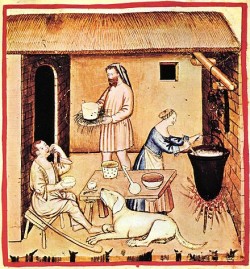Where was the world’s first commercial cheese factory established?
 February 3, 1815 — The world’s first commercial cheese factory was established in Switzerland today in 1815.
February 3, 1815 — The world’s first commercial cheese factory was established in Switzerland today in 1815.
However, it was in the United States where large-scale production found real success. Credit goes to Jesse Williams, who today is known as the Father of Cheese. A dairy farmer from Rome, New York, in the spring of 1851 he started making cheese in an assembly-line fashion using the milk from neighboring farms. Within decades, hundreds of such dairy associations existed.
The 1860s saw the beginnings of mass-produced rennet, and by the turn of the century scientists were producing pure microbial cultures. Before then, bacteria in cheese making had come from the environment or from recycling an earlier batch’s whey; the pure cultures meant a more standardized cheese could be produced. With the mass production of cheese making it more readily available to the poorer classes, simple cost-effective storage solutions for cheese gained popularity.
Ceramic cheese dishes, or cheese bells, became one of the most common ways to prolong the life of cheese in the home, and remained the most popular in most households until the introduction of the home refrigerator in 1913.
Did you know: The archaic myth of the culture-hero Aristaeus introduced bee-keeping and cheese-making before wine was known in Greece.
Popular European cheeses, including French Brie, Dutch Gouda, English Cheddar and Italian Parmesan, date back to the mid to Middle Ages. Parmesan, in fact, is close to its original form. With the advent of industrial processing, however, many others were stripped of their defining local traits so they could be delivered to the mass market.
The standardization of cheese, however, allowed them to eventually be distributed in countries that had never eaten cheese — including Asia, Africa, and South America.
Sources
Words of Wisdom
From pioneers like Jesse Williams, who founded the factory system of processing dairy products in large volume, came the ideas and tools that have made America great. Where would Jesse have been in his history-making development had he said 'I can’t do it that way because that isn’t the way my father did it?' Where would our nation be had not pioneers such as Jesse dared to do things differently?





